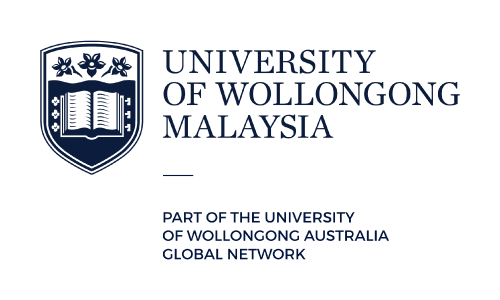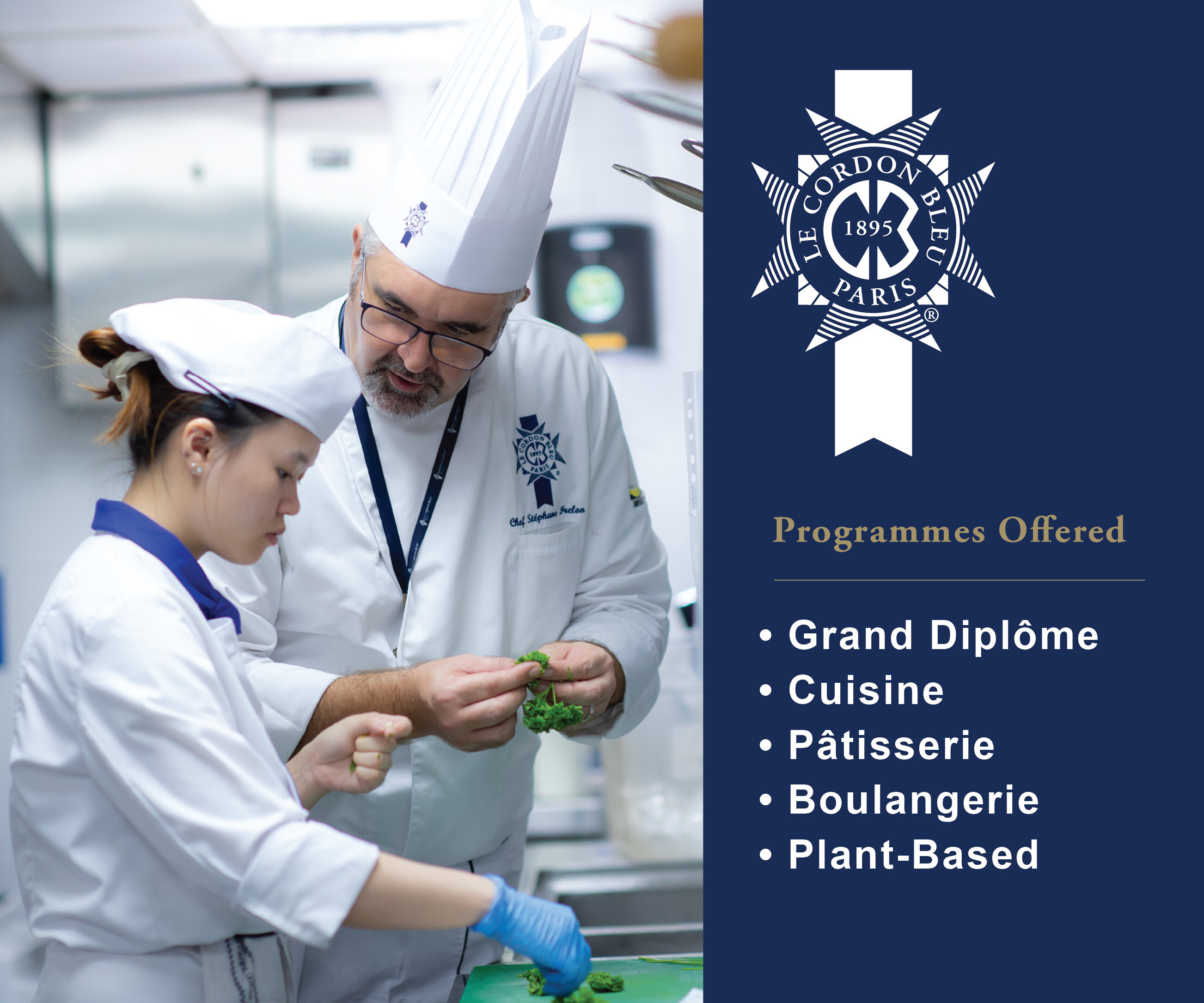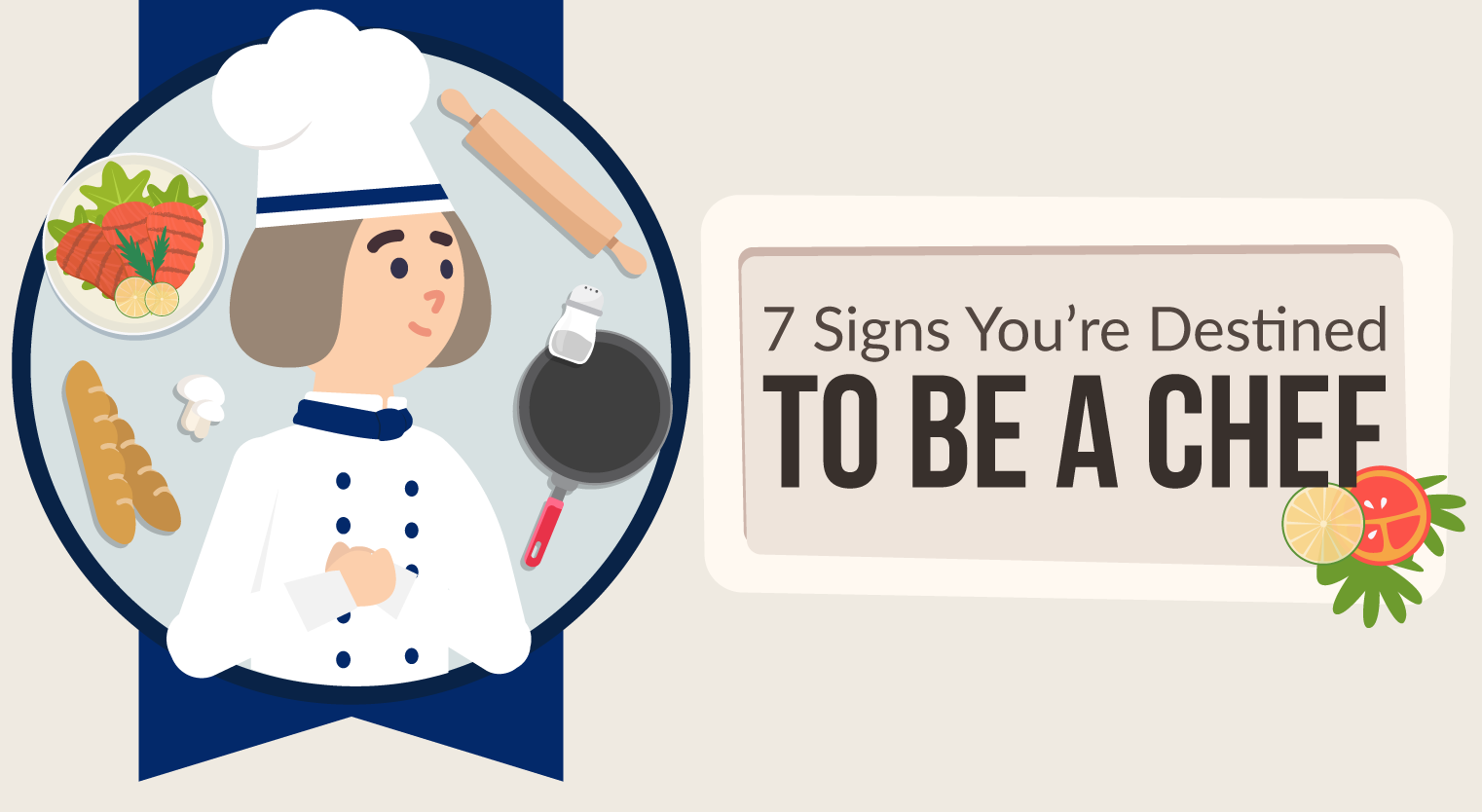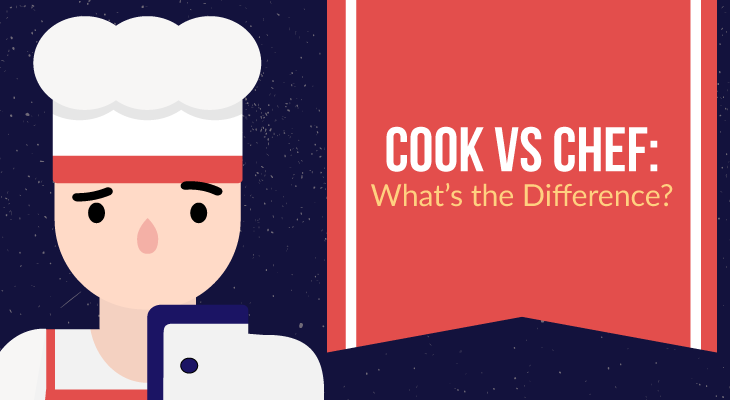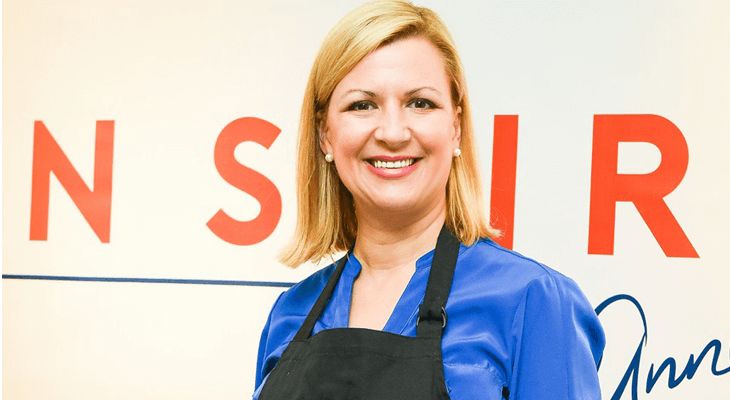The Complete Guide to Studying Culinary Arts in Malaysia
Explore the pathway into culinary arts and learn more about studying the programme in Malaysian including its career prospects and institutions with this complete guide.
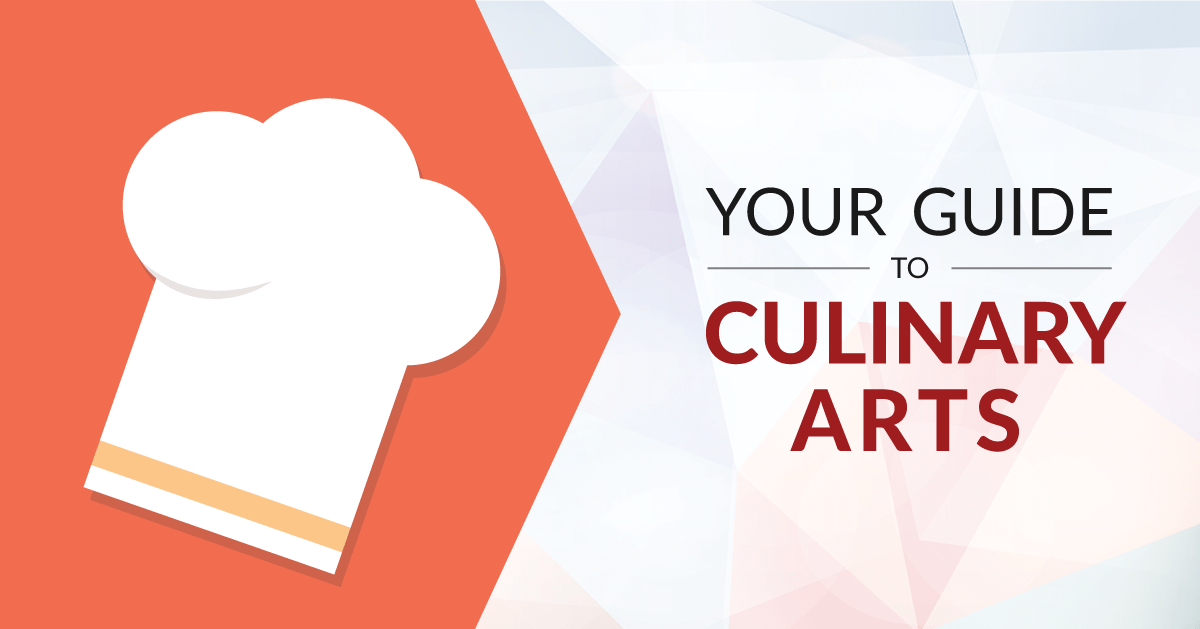
If you’ve ever dreamt of being the next Master Chef, this guide on studying a culinary arts course in Malaysia will answer all your burning questions.
We explain what culinary arts is, what you’ll study in a culinary arts course and which are the best culinary schools in Malaysia.
Ready to take on the gastronomical world by storm? Read on for more juicy insights about studying a culinary arts course in Malaysia.

Sunway Le Cordon Bleu
Diplôme de Cuisine
✓Offers internationally recognised culinary programs taught by experienced and qualified professionals
#1. What is Culinary Arts
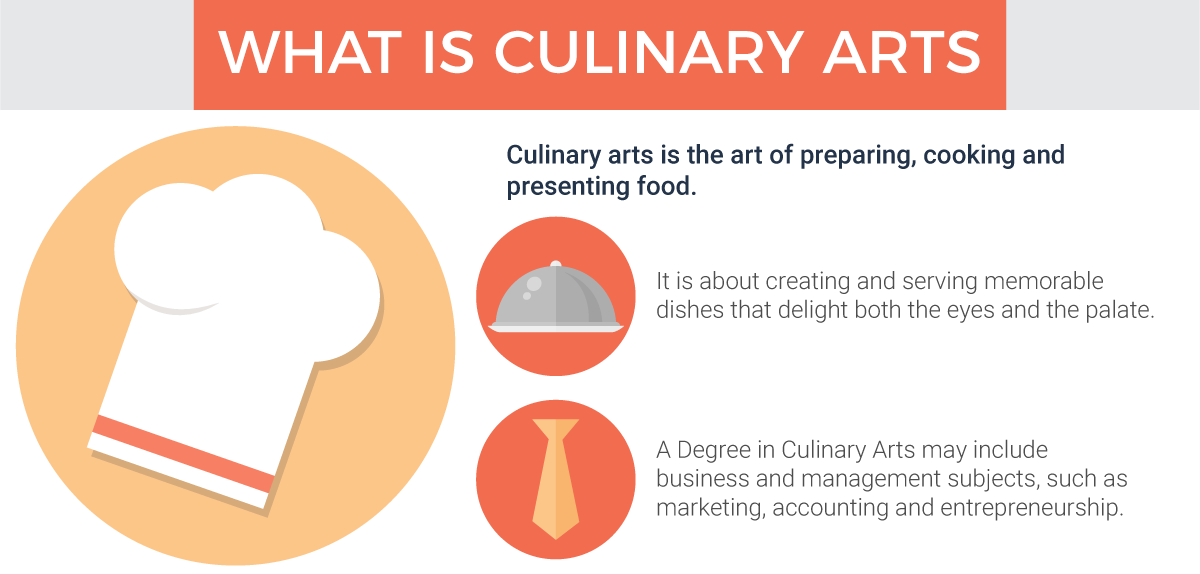
Culinary arts is the art of preparing, cooking and presenting food.
More than just putting together a dish to fill a person’s stomach, culinary arts is about creating and serving memorable dishes that delight both the eyes and the palate. Anyone can cook a meal to fend off hunger, but only the brilliant can prepare a meal that will lure people to come back for more.
A course in culinary arts will impart the knowledge, skills and techniques to prepare various types of food and beverages, from Western and Asian cuisine to bread, cakes and pastries. You will also learn how to work in a kitchen and run it effectively.
In addition, a Degree in Culinary Arts may include business and management subjects, such as marketing, accounting and entrepreneurship. These are particularly useful if you want to take up a managerial position in the F&B (food and beverage) or hospitality industry, or start your own restaurant.
Fields of Culinary Arts
There are several types of culinary courses that you can explore.
| Field | What It Is |
|---|---|
| Culinary arts | Deals with preparing different food and cuisine, with some exposure to pastry and baking. |
| Pastry and baking | Specialises in the professional preparation of pastries, cakes and baked goods, sometimes known as patisserie. |
| Culinary management | Deals with managing F&B and kitchen operations, with some exposure to basic culinary arts. |
Sounds like fun? Keep reading to find out what it takes to make it in this field!

Sunway Le Cordon Bleu
Diplôme de Cuisine
✓Offers internationally recognised culinary programs taught by experienced and qualified professionals
#2. Culinary Arts Requirements
a) What subjects are required for culinary arts?
There are no required subjects in order to pursue a culinary arts course. As long as you meet the entry requirements for the institution, you will be able to enrol for a culinary arts course.
b) Diploma in Culinary Arts Requirements
These are the general entry requirements for a Diploma in Culinary Arts:
- SPM (or equivalent): Minimum 3Cs
c) Culinary Arts Degree Requirements
To pursue a Degree in Culinary Arts, you need to complete a pre-university programme and meet the entry requirements.
- A-Level: Minimum 2Ds
- STPM: Minimum 2Cs
- Foundation in Arts or Foundation in Science: Minimum CGPA of 2.00
- Diploma: Minimum CGPA of 2.00
Some culinary arts courses may also require you to pass an English test, such as MUET or IELTS.

#3. Studying Culinary Arts in Malaysia
a) What do you study in culinary arts?
As part of a culinary arts programme, you will learn various subjects that will hone your culinary skills. From food preparation to kitchen service and restaurant operations, you will develop the knowledge and skills needed for a successful culinary career!
Here are some of the subjects that you may learn:
- Food and Beverage Services
- Essential Cuisine Techniques
- Kitchen Operations and Management
- Food Hygiene and Sanitation
- Patisserie and Baking
- Revenue and Profit Management
- Menu Design and Creation
In most universities and culinary schools, you will usually be required to undergo an internship or industrial training as part of your studies so that you can gain hands-on experience in the industry. This is your chance to shine, as you could very well land a job even before you graduate!
Compared to a diploma, a Degree in Culinary Arts focuses more on developing entrepreneurial and management skills in the F&B industry.
b) How long is culinary school?
A Diploma in Culinary Arts in Malaysia typically takes 2 years to complete while a degree takes about 3 years. Some culinary schools offer shorter culinary courses with a duration of 9 to 12 months.
c) How much does it cost to study Culinary Arts in Malaysia?
The total estimated fees to pursue a Culinary Arts Diploma in Malaysia can range from RM12,000 to RM49,200. Meanwhile, a Culinary Arts Degree can range from RM49,200 to RM49,230.

Sunway Le Cordon Bleu
Diplôme de Cuisine
✓Offers internationally recognised culinary programs taught by experienced and qualified professionals
#4. How Do You Pursue a Culinary Career?
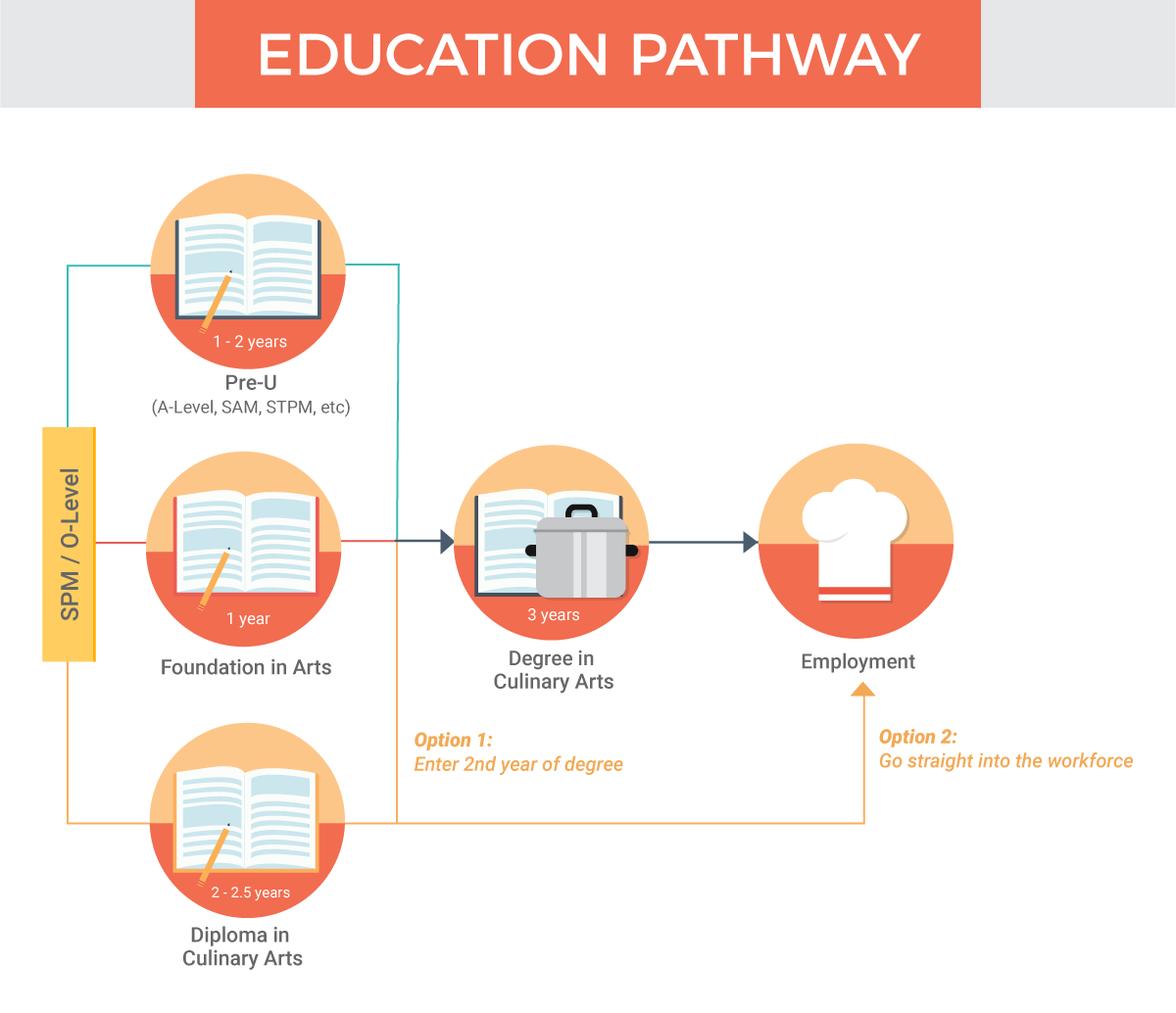 Firstly, upon completing your SPM or equivalent, you can choose to take a pre-university course (e.g. A-Level, STPM, Matrikulasi) or a Foundation in Arts. After that, you may proceed to a Degree in Culinary Arts. Having a degree will equip you with the knowledge and skills to pursue a culinary career.
Firstly, upon completing your SPM or equivalent, you can choose to take a pre-university course (e.g. A-Level, STPM, Matrikulasi) or a Foundation in Arts. After that, you may proceed to a Degree in Culinary Arts. Having a degree will equip you with the knowledge and skills to pursue a culinary career.
Alternatively, instead of taking a pre-university or foundation course, you can pursue a Diploma in Culinary Arts. Completing this course will allow you to head straight into the workforce to begin your culinary career, or progress to a Degree in Culinary Arts.
#5. Should You Study Culinary Arts?
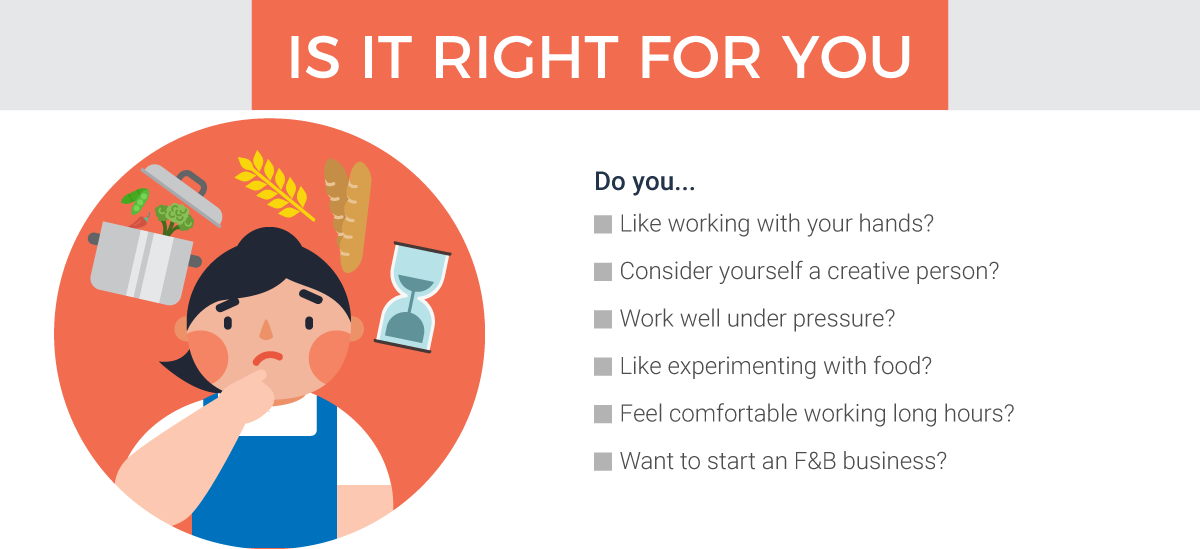
a) Is culinary arts the right course for you?
If you’re wondering whether you should take up culinary arts, here are some questions to ponder:
- Do you like working with your hands?
- Do you consider yourself a creative person?
- Do you work well under pressure?
- Are you always experimenting with food and recipes?
- Will you be comfortable working on your feet for long hours?
- Do you want to start an F&B business?
b) Skills required to be a chef
Here are some key skills a good chef should have:
- Broad and in-depth knowledge of food
- Excellent communication skills
- Strong management and organisational skills
- Creativity to come up with innovative dishes
- Ability to work well under pressure
- Fast-paced decision-making skills
- Ability to cooperate and work in a team

#6. What Are the Job Opportunities in Culinary Arts
Those with a culinary arts qualification can seek employment in the F&B and hospitality industry.
Here are some careers that you can pursue upon graduating:
- Commis Chef
- Station Chef / Chef de Partie
- Sous Chef
- Executive Chef / Chef de Cuisine
- Pastry Chef
- Food Marketing Consultant
- Food Service Manager
- Restaurant Manager
#7. Best Culinary Schools in Malaysia
If culinary arts is right up your alley, then check out some of the best universities for culinary arts in Malaysia.
Sunway Le Cordon Bleu
Bandar Sunway, Selangor
Intake
Jan, Apr, Jul, Oct
Tuition Fees
RM101,300
Get RM300 Rebate when you enrol through EduAdvisor! T&C apply.

